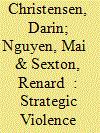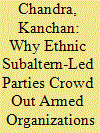|
|
|
Sort Order |
|
|
|
Items / Page
|
|
|
|
|
|
|
| Srl | Item |
| 1 |
ID:
165598


|
|
|
|
|
| Summary/Abstract |
How is the use of political lotteries related to party development? This article discusses the effects of a lottery-based procedure used to distribute committee appointments that was once common across legislatures in nineteenth-century Europe. The authors analyze the effects of a political lottery in budget committee selection in the French Third Republic using a microlevel data set of French deputies from 1877 to 1914. They argue that the adoption and benefit of lottery-based procedures were to prevent the capture of early institutions by party factions or groups of self-interested political elites. The authors find that partial randomization of selection resulted in the appointment of young, skilled, middle-class deputies at the expense of influential elites. When parties gained control of committee assignments in 1910, selection once again favored elites and loyal party members. The authors link lottery-based procedures to party development by showing that cohesive parties were behind the institutional reform that ultimately dismantled this selection process. Lottery-based procedures thus played a sanitizing role during the transformation of emerging parliamentary groups into unified, cohesive political parties.
|
|
|
|
|
|
|
|
|
|
|
|
|
|
|
|
| 2 |
ID:
165600


|
|
|
|
|
| Summary/Abstract |
This article investigates the role of colonial pressure on state centralization and its relationship to subsequent development by analyzing the influence of Western colonial threats on Siam’s internal political reform. Unlike other countries in the region, Siam remained independent by adopting geographical administrative boundaries and incorporating its traditional governance structures into a new, centralized governance system. The authors find that the order in which areas were integrated into the centralized system depended on the interaction between precentralization political structures and proximity to British and French territorial claims. The authors show that areas centralized early in the process had higher levels of infrastructure investment and public goods provision at the time the centralization process was completed in 1915 than those centralized later in the process. They also show that early centralization during the Western colonial era continued to be strongly associated with higher levels of public goods provision and economic development, and that this relationship persists today.
|
|
|
|
|
|
|
|
|
|
|
|
|
|
|
|
| 3 |
ID:
165601


|
|
|
|
|
| Summary/Abstract |
Democratic transitions are often followed by conflict. This article explores one explanation: the military’s strategic use of violence to retain control of economically valuable regions. The authors uncover this dynamic in Myanmar, a country transitioning from four decades of military rule. Fearing that the new civilian government will assert authority over jade mining, the military initiated violence in mining townships. Using geocoded data on conflict and jade mines, the authors find evidence for this strategic use of violence. As Myanmar started to transition in 2011, conflicts instigated by the military in jademining areas sharply rose. The article also addresses alternative explanations, including a shift in the military’s strategy, colocation of mines and military headquarters, commodity prices, opposition to a controversial dam, and trends specific to Kachin State. With implications beyond Myanmar, the authors argue that outgoing generals can use instability to retain rents where plausible challengers to state authority provide a pretense for violence.
|
|
|
|
|
|
|
|
|
|
|
|
|
|
|
|
| 4 |
ID:
165599


|
|
|
|
|
| Summary/Abstract |
The transition from Fordism to the knowledge economy in the world’s advanced democracies was underpinned by the revolution in information and communications technology (ict). The introduction and rapid diffusion of ict pushed up wages for college-educated workers with complementary skills and allowed top managers and CEOs to reap greater rewards for their own talents. Despite these common pressures, income inequality did not rise to the same extent everywhere; income in the Anglo-Saxon countries remains particularly unequally distributed. To shed new light on this puzzle, the authors carry out a panel data analysis of eighteen oecd countries between 1970 and 2007. Their analysis stands apart from the existing empirical literature by taking a comparative perspective. The article examines the extent to which the relationship between the knowledge economy and income inequality is influenced by national labor market institutions. The authors find that the expansion of knowledge employment is positively associated with both the 90/10 wage ratio and the income share of the top 1 percent, but that these effects are mitigated by the presence of strong labor market institutions, such as coordinated wage bargaining, strict employment protection legislation, high union density, and high collective bargaining coverage. The authors provide robust evidence against the argument that industrial relations systems are no longer important safeguards of wage solidarity in the knowledge economy.
|
|
|
|
|
|
|
|
|
|
|
|
|
|
|
|
| 5 |
ID:
165602


|
|
|
|
|
| Summary/Abstract |
This article asks why some Indian districts experience chronic Maoist violence while others do not. The answer helps to explain India’s Maoist civil war, which is the product of the accumulation of violence in a few districts, as well as to generate a new hypothesis about the causes of civil war more generally. The authors argue that, other things equal, the emergence of subaltern-led parties at the critical juncture before armed organizations enter crowds them out: the stronger the presence of subaltern-led political parties in a district at this juncture, the lower the likelihood of experiencing chronic armed violence subsequently. They develop their argument through field research and test its main prediction using an original, district-level data set on subaltern incorporation and Maoist violence in India between 1967 and 2008. The article contributes a new, party-based explanation to the literatures on both civil war and Maoist violence in India. It also introduces new district-level data on the Maoist movement and on the incorporation of subaltern ethnic groups by political parties in India.
|
|
|
|
|
|
|
|
|
|
|
|
|
|
|
|
|
|
|
|
|